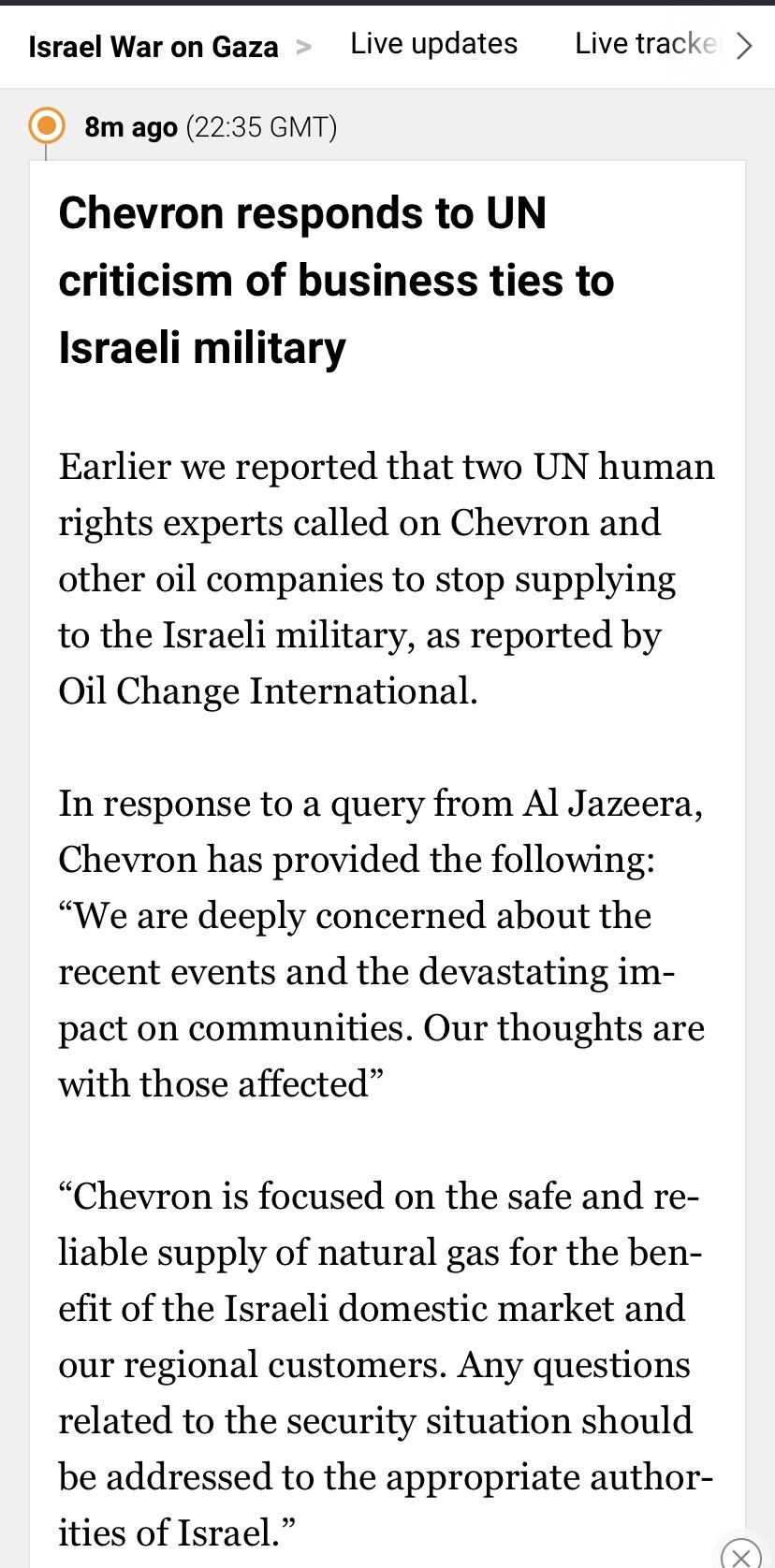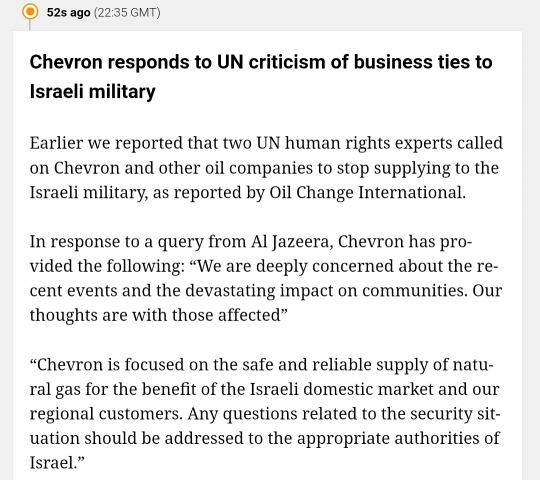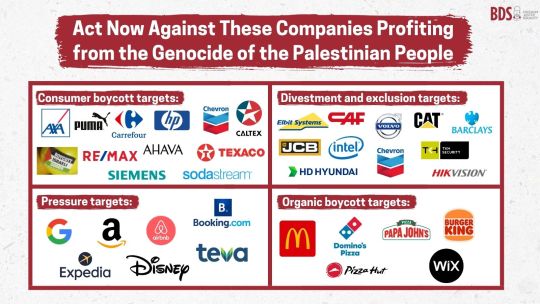#boycott chevron
Explore tagged Tumblr posts
Text

punks support Palestine. if you consider yourself a punk and don’t have a problem with what is happening in Gaza, you are not a punk. you’re just a problem. unfollow if you support the israeli government
#free palestine#long beach palestine rally#palestine rally#boycott chevron#long beach#palestine#israel
190 notes
·
View notes
Text


#chevron#people over profit#free palestine#palestine#gaza#free gaza#current events#israel#us politics#gaza genocide#usa are supporting genocide#usa news#usa#gasoline#oil#stop funding genocide#stop funding israel#stop genocide#stop israel#fake sympathy#corporate greed#corporate social responsibility#boycott#boycott chevron#boycott for palestine#boycott israel#israel is committing genocide#cop out#world news
25 notes
·
View notes
Text

Raging Grannies sing Boycott Chevron! See article here.
Protest Targets South Bay Chevron Stations
2 notes
·
View notes
Text


#boycotts work#uc davis#boycott israel#boycott divest sanction#boycott starbucks#boycott mcdonalds#boycott chevron#boycott disney#boycott sabra#apartheid#save palestine#ethnic cleansing#israel is an apartheid state#seek truth#free palestine 🇵🇸#genocide#illegal occupation#israel is committing genocide#israeli war crimes#spread awareness#put your money where your mouth is#dont let your money help fund genocide#boycott dell#boycott apple#boycott for palestine#boycott kfc#boycott nestle#boycott kinder#boycott sodastream#boycott stranger things
6 notes
·
View notes
Text
Tell Chevron CEO Mike Wirth You’re Boycotting Chevron
#boycott divestment sanctions#chevron#boycott chevron#bds#sign#please sign#please share#gaza war#gaza genocide#genocide#israel#palestine#gaza#free palestine#free gaza#stop the genocide#stop the war
0 notes
Text
youtube
Greta Thunberg STILL Undefeated As She Calls for Chevron Boycott
The Bitchuation Room (with Francesca Fiorentini)
Sep 29 2024
What do the Palestine movement and environmental movement have in common? Plenty.
Recently, at the intersection, our girl Greta Thunberg is uplifting a BDS call to boycott Chevron because of their exploitation of Palestinian land and resources. : “In Palestine and all over the world, the fight against colonialism and corporations’ destruction of the planet are intrinsically linked,” said Thunberg. “Look at Chevron. Everyone knows that Chevron is one of the world’s biggest climate criminals, but the oil giant is also fueling Israel’s genocide in Palestine.” Chevron runs pipelines and extracts natural gas on occupied land in partnership with Israel and the company is a major economic partner of the Israeli government. They made an estimated $1.5 billion in revenue from Tamar and Leviathan gas sales alone in 2022.
Beyond Chevron, the bombing of Palestine itself is immensely harmful to the planet. In just the first two months of the war, the carbon emissions generated from the bombardment are on par with that of the country of New Zealand or Uruguay annually. Even after the military occupation retreats, they will leave behind contaminated soil, water, and air.
Overall, scholars estimate that militaries are responsible for 5.5% of global greenhouse gas emissions. Clearly, it's integral for the movement against climate change to stand against war. This is something Greta is very vocal about, even if it loses her centrist followers and fans. By standing up for Palestine, Greta Thunberg is making enemies.
#BDS WORKS#BOYCOTT CHEVRON NOW#greta thunberg#climate crisis#climate emergency#streamers for ceasefire#creators for palestine#teachers for palestine#artists for palestine#israel is a terrorist state#end the occupation#free palestine#boycott divest sanction#boycott israel#boycott chevron#boycott motorola#boycott adidas#boycott puma#boycott CAT bulldozers#boycott jellycat#boycott hp#boycott mcdonalds#boycott dominoes#we will not stop we will not rest#from genocide we must divest#take it off for palestine#humanitarian crisis#climate warming#tipping point#nature
0 notes
Text

#free gaza#free palestine#gaza strip#irish solidarity with palestine#palestine#gaza#news on gaza#al jazeera#boycott israel#israel#UN#Chevron#Oil Change International
20 notes
·
View notes
Text
The two people who were beaten up and arrested by HPD yesterday for taking issue with Dueling Local Pride Org 1's partnership with a pro-genocide corporation are free now! Happy Pride, and remember that all cops and the orgs who welcome them can go [REDACTED] themselves in a [REDACTED] [REDACTED] with a [REDACTED]
3 notes
·
View notes
Text
BDS has updated their calls for consumer boycotts to include: Chevron (and Texaco and Caltex by extension). Here is their most current boycott list.
They have also officially called for a boycott of McDonald’s. Here is their Instagram post on McDonald’s.
#Chevron was previously on the divestment list#also I believe BDS can have local chapters to check to see if your community has specific calls#and have chapters in other countries
30K notes
·
View notes
Text
I really truly just feel no pity for people who respond to boycotts by saying “oh but I just could live without my *insert name of any unnecessary luxury good* hahaha 🤣”
Actually you can live without going to the movie theater for a bit. You can live without another pair of shoes and your Disney parks ear headbands and your comfort show and the newest iPhone and that microtrendy dress at H&M or Cider or Shein or the like.
You can live without those things! It’s not funny to say otherwise!
#there are situations where I am really forgiving of people not being able to participate in boycotts#like gas is a good example- if the only gas stations in your middle of nowhere town are Shell and Chevron then that’s fine#but overall it truly is not hard to just live without luxury goods for the sake of a boycott
1 note
·
View note
Text

New boycott targets called for by the BDS movement. More info on why on their website.
8K notes
·
View notes
Text
MIT libraries are thriving without Elsevier

I'm coming to BURNING MAN! On TUESDAY (Aug 27) at 1PM, I'm giving a talk called "DISENSHITTIFY OR DIE!" at PALENQUE NORTE (7&E). On WEDNESDAY (Aug 28) at NOON, I'm doing a "Talking Caterpillar" Q&A at LIMINAL LABS (830&C).

Once you learn about the "collective action problem," you start seeing it everywhere. Democrats – including elected officials – all wanted Biden to step down, but none of them wanted to be the first one to take a firm stand, so for months, his campaign limped on: a collective action problem.
Patent trolls use bullshit patents to shake down small businesses, demanding "license fees" that are high, but much lower than the cost of challenging the patent and getting it revoked. Collectively, it would be much cheaper for all the victims to band together and hire a fancy law firm to invalidate the patent, but individually, it makes sense for them all to pay. A collective action problem:
https://locusmag.com/2013/11/cory-doctorow-collective-action/
Musicians get royally screwed by Spotify. Collectively, it would make sense for all of them to boycott the platform, which would bring it to its knees and either make it pay more or put it out of business. Individually, any musician who pulls out of Spotify disappears from the horizon of most music fans, so they all hang in – a collective action problem:
https://pluralistic.net/2024/06/21/off-the-menu/#universally-loathed
Same goes for the businesses that get fucked out of 30% of their app revenues by Apple and Google's mobile business. Without all those apps, Apple and Google wouldn't have a business, but any single app that pulls out commits commercial suicide, so they all hang in there, paying a 30% vig:
https://pluralistic.net/2024/08/15/private-law/#thirty-percent-vig
That's also the case with Amazon sellers, who get rooked for 45-51 cents out of every dollar in platform junk fees, and whose prize for succeeding despite this is to have their product cloned by Amazon, which underprices them because it doesn't have to pay a 51% rake on every sale. Without third-party sellers there'd be no Amazon, but it's impossible to get millions of sellers to all pull out at once, so the Bezos crime family scoops up half of the ecommerce economy in bullshit fees:
https://pluralistic.net/2023/11/06/attention-rents/#consumer-welfare-queens
This is why one definition of "corruption" is a system with "concentrated gains and diffuse losses." The company that dumps toxic waste in your water supply reaps all the profits of externalizing its waste disposal costs. The people it poisons each bear a fraction of the cost of being poisoned. The environmental criminal has a fat warchest of ill-gotten gains to use to bribe officials and pay fancy lawyers to defend it in court. Its victims are each struggling with the health effects of the crimes, and even without that, they can't possibly match the polluter's resources. Eventually, the polluter spends enough money to convince the Supreme Court to overturn "Chevron deference" and makes it effectively impossible to win the right to clean water and air (or a planet that's not on fire):
https://www.cfr.org/expert-brief/us-supreme-courts-chevron-deference-ruling-will-disrupt-climate-policy
Any time you encounter a shitty, outrageous racket that's stable over long timescales, chances are you're looking at a collective action problem. Certainly, that's the underlying pathology that preserves the scholarly publishing scam, which is one of the most grotesque, wasteful, disgusting frauds in our modern world (and that's saying something, because the field is crowded with many contenders).
Here's how the scholarly publishing scam works: academics do original scholarly research, funded by a mix of private grants, public funding, funding from their universities and other institutions, and private funds. These academics write up their funding and send it to a scholarly journal, usually one that's owned by a small number of firms that formed a scholarly publishing cartel by buying all the smaller publishers in a string of anticompetitive acquisitions. Then, other scholars review the submission, for free. More unpaid scholars do the work of editing the paper. The paper's author is sent a non-negotiable contract that requires them to permanently assign their copyright to the journal, again, for free. Finally, the paper is published, and the institution that paid the researcher to do the original research has to pay again – sometimes tens of thousands of dollars per year! – for the journal in which it appears.
The academic publishing cartel insists that the millions it extracts from academic institutions and the billions it reaps in profit are all in service to serving as neutral, rigorous gatekeepers who ensure that only the best scholarship makes it into print. This is flatly untrue. The "editorial process" the academic publishers take credit for is virtually nonexistent: almost everything they publish is virtually unchanged from the final submission format. They're not even typesetting the paper:
https://link.springer.com/article/10.1007/s00799-018-0234-1
The vetting process for peer-review is a joke. Literally: an Australian academic managed to get his dog appointed to the editorial boards of seven journals:
https://www.atlasobscura.com/articles/olivia-doll-predatory-journals
Far from guarding scientific publishing from scams and nonsense, the major journal publishers have stood up entire divisions devoted to pay-to-publish junk science. Elsevier – the largest scholarly publisher – operated a business unit that offered to publish fake journals full of unreveiwed "advertorial" papers written by pharma companies, packaged to look like a real journal:
https://web.archive.org/web/20090504075453/http://blog.bioethics.net/2009/05/merck-makes-phony-peerreview-journal/
Naturally, academics and their institutions hate this system. Not only is it purely parasitic on their labor, it also serves as a massive brake on scholarly progress, by excluding independent researchers, academics at small institutions, and scholars living in the global south from accessing the work of their peers. The publishers enforce this exclusion without mercy or proportion. Take Diego Gomez, a Colombian Masters candidate who faced eight years in prison for accessing a single paywalled academic paper:
https://www.eff.org/deeplinks/2014/07/colombian-student-faces-prison-charges-sharing-academic-article-online
And of course, there's Aaron Swartz, the young activist and Harvard-affiliated computer scientist who was hounded to death after he accessed – but did not publish – papers from MIT's JSTOR library. Aaron had permission to access these papers, but JSTOR, MIT, and the prosecutors Stephen Heymann and Carmen Ortiz argued that because he used a small computer program to access the papers (rather than clicking on each link by hand) he had committed 13 felonies. They threatened him with more than 30 years in prison, and drew out the proceedings until Aaron was out of funds. Aaron hanged himself in 2013:
https://en.wikipedia.org/wiki/Aaron_Swartz
Academics know all this terrible stuff is going on, but they are trapped in a collective action problem. For an academic to advance in their field, they have to publish, and they have to get their work cited. Academics all try to publish in the big prestige journals – which also come with the highest price-tag for their institutions – because those are the journals other academics read, which means that getting published is top journal increases the likelihood that another academic will find and cite your work.
If academics could all agree to prioritize other journals for reading, then they could also prioritize other journals for submissions. If they could all prioritize other journals for submissions, they could all prioritize other journals for reading. Instead, they all hold one another hostage, through a wicked collective action problem that holds back science, starves their institutions of funding, and puts their colleagues at risk of imprisonment.
Despite this structural barrier, academics have fought tirelessly to escape the event horizon of scholarly publishing's monopoly black hole. They avidly supported "open access" publishers (most notably PLoS), and while these publishers carved out pockets for free-to-access, high quality work, the scholarly publishing cartel struck back with package deals that bundled their predatory "open access" journals in with their traditional journals. Academics had to pay twice for these journals: first, their institutions paid for the package that included them, then the scholars had to pay open access submission fees meant to cover the costs of editing, formatting, etc – all that stuff that basically doesn't exist.
Academics started putting "preprints" of their work on the web, and for a while, it looked like the big preprint archive sites could mount a credible challenge to the scholarly publishing cartel. So the cartel members bought the preprint sites, as when Elsevier bought out SSRN:
https://www.techdirt.com/2016/05/17/disappointing-elsevier-buys-open-access-academic-pre-publisher-ssrn/
Academics were elated in 2011, when Alexandra Elbakyan founded Sci-Hub, a shadow library that aims to make the entire corpus of scholarly work available without barrier, fear or favor:
https://sci-hub.ru/alexandra
Sci-Hub neutralized much of the collective action trap: once an article was available on Sci-Hub, it became much easier for other scholars to locate and cite, which reduced the case for paying for, or publishing in, the cartel's journals:
https://arxiv.org/pdf/2006.14979
The scholarly publishing cartel fought back viciously, suing Elbakyan and Sci-Hub for tens of millions of dollars. Elsevier targeted prepress sites like academia.edu with copyright threats, ordering them to remove scholarly papers that linked to Sci-Hub:
https://svpow.com/2013/12/06/elsevier-is-taking-down-papers-from-academia-edu/
This was extremely (if darkly) funny, because Elsevier's own publications are full of citations to Sci-Hub:
https://eve.gd/2019/08/03/elsevier-threatens-others-for-linking-to-sci-hub-but-does-it-itself/
Meanwhile, scholars kept the pressure up. Tens of thousands of scholars pledged to stop submitting their work to Elsevier:
http://thecostofknowledge.com/
Academics at the very tops of their fields publicly resigned from the editorial board of leading Elsevier journals, and published editorials calling the Elsevier model unethical:
https://www.theguardian.com/science/blog/2012/may/16/system-profit-access-research
And the New Scientist called the racket "indefensible," decrying the it as an industry that made restricting access to knowledge "more profitable than oil":
https://www.newscientist.com/article/mg24032052-900-time-to-break-academic-publishings-stranglehold-on-research/
But the real progress came when academics convinced their institutions, rather than one another, to do something about these predator publishers. First came funders, private and public, who announced that they would only fund open access work:
https://www.nature.com/articles/d41586-018-06178-7
Winning over major funders cleared the way for open access advocates worked both the supply-side and the buy-side. In 2019, the entire University of California system announced it would be cutting all of its Elsevier subscriptions:
https://www.science.org/content/article/university-california-boycotts-publishing-giant-elsevier-over-journal-costs-and-open
Emboldened by the UC system's principled action, MIT followed suit in 2020, announcing that it would no longer send $2m every year to Elsevier:
https://pluralistic.net/2020/06/12/digital-feudalism/#nerdfight
It's been four years since MIT's decision to boycott Elsevier, and things are going great. The open access consortium SPARC just published a stocktaking of MIT libraries without Elsevier:
https://sparcopen.org/our-work/big-deal-knowledge-base/unbundling-profiles/mit-libraries/
How are MIT's academics getting by without Elsevier in the stacks? Just fine. If someone at MIT needs access to an Elsevier paper, they can usually access it by asking the researchers to email it to them, or by downloading it from the researcher's site or a prepress archive. When that fails, there's interlibrary loan, whereby other libraries will send articles to MIT's libraries within a day or two. For more pressing needs, the library buys access to individual papers through an on-demand service.
This is how things were predicted to go. The libraries used their own circulation data and the webservice Unsub to figure out what they were likely to lose by dropping Elsevier – it wasn't much!
https://unsub.org/
The MIT story shows how to break a collective action problem – through collective action! Individual scholarly boycotts did little to hurt Elsevier. Large-scale organized boycotts raised awareness, but Elsevier trundled on. Sci-Hub scared the shit out of Elsevier and raised awareness even further, but Elsevier had untold millions to spend on a campaign of legal terror against Sci-Hub and Elbakyan. But all of that, combined with high-profile defections, made it impossible for the big institutions to ignore the issue, and the funders joined the fight. Once the funders were on-side, the academic institutions could be dragged into the fight, too.
Now, Elsevier – and the cartel – is in serious danger. Automated tools – like the Authors Alliance termination of transfer tool – lets academics get the copyright to their papers back from the big journals so they can make them open access:
https://pluralistic.net/2021/09/26/take-it-back/
Unimaginably vast indices of all scholarly publishing serve as important adjuncts to direct access shadow libraries like Sci-Hub:
https://pluralistic.net/2021/10/28/clintons-ghost/#cornucopia-concordance
Collective action problems are never easy to solve, but they're impossible to address through atomized, individual action. It's only when we act as a collective that we can defeat the corruption – the concentrated gains and diffuse losses – that allow greedy, unscrupulous corporations to steal from us, wreck our lives and even imprison us.

Community voting for SXSW is live! If you wanna hear RIDA QADRI and me talk about how GIG WORKERS can DISENSHITTIFY their jobs with INTEROPERABILITY, VOTE FOR THIS ONE!

If you'd like an essay-formatted version of this post to read or share, here's a link to it on pluralistic.net, my surveillance-free, ad-free, tracker-free blog:
https://pluralistic.net/2024/08/16/the-public-sphere/#not-the-elsevier
#pluralistic#libraries#glam#elsevier#monopolies#antitrust#scams#open access#scholarship#education#lis#oa#publishing#scholarly publishing#sci-hub#preprints#interlibrary loan#aaron swartz#aaronsw#collective action problems
629 notes
·
View notes
Text
BOYCOTTING FOR PALESTINE
The Official BDS Boycott Targets
Campaigns
Block the boat: End maritime arms transfer to Israel
Ban Apartheid Israel from Sports (FIFA, Olympics)
CAF get off Israel's train: Boycott CAF
Greenwashing Apartheid
Israeli Spyware
Military Embargo
Farming Injustice

Consumer Boycotts - a complete boycott of these brands
Cisco
Axa
Puma
Carrefour
HP
Siemens
Chevron
Intel
Caltex
Israeli produce
Re/max
Ahava
Texaco
Sodastream
Intel
Organic Boycott Targets - boycotts not initiated by BDS but still complete boycott of these brands
Disney
Macdonald's
Dominos
Papa Johns
Burger King
Pizza Hut
Wix
Divestments and exclusion - pressure governments, institutions, investment funds, city councils, etc. to exclude from procurement contracts and investments and to divest from these
Elbit Systems
CAF
Volvo
CAT
Barclays
JCB
HD Hyundai
TKH Security
HikVision
Pressure - boycotts when reasonable alternatives exist, as well as lobbying, peaceful disruptions, and social media pressure.
Google
Amazon
AirBnb
Booking.Com
Expedia
Teva
Here are some companies that strongly support Israel (but are not Boycott targets). There is no ethical consumption under capitalism and boycotting is a political strategy - not a moral one. If you did try to boycott every supporter of Israel you would struggle to survive because every major company supports Israel (as a result of attempting to keep the US economy afloat), that being said, the ones that are being boycotted by masses and not already on the organic boycott list are coloured red.
5 Star Chocolate
7Days
7Up
Apple
Arsenal FC
ALDO
Arket
Axe
Accenture
Ariel
Adidas
ActionIQ
Aquafina
Amika
AccuWeather
Activia
Adobe
Aesop
Azrieli Group
American Eagle
Amway Corp
Axel Springer
American Airlines
American Express
Atlassian
AdeS
Aquarius
Ayataka
Audi
Barqs
Bain & Company
Bayer
Bank Leumi
Bank Hapoalim
BCG (Boston Consulting Group)
Biotherm
Bershka
Bloomberg
BMW
Boeing
Booz Allen Hamilton
Burberry
Bath & Body Works
Bosch
Bristol Myers Squibb
Capri Holdings
Costa
Carita Paris
CareTrust REIT
Caterpillar
Coach
Cappy
Caudalie
CeraVe
Check Point Software Technologies
Cerelac
Chanel
Chapman and Cutler
Channel
Cheerios
Cheetos
Chevron
Chips Ahoy!
Christina Aguilera
Citi Bank
Codral
Cosco
Canada Dry
Citi
Clal Insurance Enterprises
Clean & Clear
Clearblue
Clinique
Champion
Club Social
Coca Cola
Coffee Mate
Colgate
Comcast
Compass
Caesars
Conde Nast
Cooley LLP
Costco
Côte d’Or
Crest
CV Starr
CyberArk Software
Cytokinetics
Crayola
Cra Z Art
Daimler
Dr Pepper
Del Valle
Daim
Doctor Pepper
Dasani
Doritos
Daz
Dior
Dell
Deloitte
Delta Air Lines
Deutsche Bank
Deutsche Telekom
DHL Group
David Off
Disney
DLA Piper
Domestos
Domino’s
Douglas Elliman
Downy
Duane Morris LLP
Dreft Baby Detergent & Laundry Products
Dreyer’s Grand Ice Cream
eBay
Edelman
Eli Lilly
Evian
Empyrean
Ericsson
Endeavor
EPAM Systems
Estee Lauder
Elbit Systems
EY
Forbes
Facebook
Fairlife
Fanta
First International Bank of Israel
Fiverr
Funyuns
Fuze
Fox News
Fritos
Fox Corp
Gatorade
Gamida Cell
GE
Glamglow
General Catalyst
General Motors
Georgia
Gold Peak
Genesys
Goldman Sachs
Grandma’s Cookies
Garnier
Guess
Greenberg Traurig
Guerlain
Givenchy
H&M
Hadiklaim
Huggies
Hanes
HSBC
Head & Shoulders
Hersheys
Herbert Smith Freehills
Hewlett Packard
Hasbro
Hyundai
Henkel
Harel Insurance Investment & Financial Services
Hewlett Packard Enterprise
HubSpot
Huntsman Corp
IBM
Innocent
Insight Partners
Inditex Group
IT Cosmetics
Instacart
Intermedia
Interpublic Group
Instagram
ICL Group
Intuit
Jazwares
Jefferies
John Lewis
JP Morgan Chase
Jaguar
Johnson & Johnson
JPMorgan
Kenon Holdings
Kate Spade
Kirks’
Kinley Water
KKR
KFC
KKW Cosmetics
Kurkure
Keebler
Kolynos
Kaufland
Kevita
Knorr
KPMG
Lemonade
Lidl
Loblaws
Levi Strauss
Louis Vuitton
Life Water
Levi’s
Levi’s Strauss
LinkedIn
Land Rover
L’Oréal
Lego
Levissima
Live Nation Entertainment
Lufthansa
La Roche-Posay
Lipton
Major League Baseball
Manpower Group
Marriott
Marsh McLennan
Maison Francis Kurkdjian
Mastercard
Mattel
Minute Maid
Monster
Monki
Mainz FC
Mellow Yellow
Mountain Dew
Migdal Insurance
Marks & Spencer
Mirinda
McDermott Will & Emery
Motorola
McKinsey
Merck
Michael Kors
Mizrahi Tefahot Bank
Merck KGaA
Micheal Kors
Milkybar
Maybelline
Mount Franklin
Meta
MeUndies
Mattle
Microsoft
Munchies
Miranda
Morgan Lewis
Moroccanoil
Morgan Stanley
MRC
Nasdaq
Naughty Dog
Nivea
Next
NOS
Nabisco
Nutter Butter
No Frills
National Basketball Association
National Geographic
Nintendo
New Balance
Nutella
Newtons
NVIDIA
Netflix
Nescafe
Nestle
Nesquick
Nike
Nussbeisser
Oreo
Oral B
Old spice
Oysho
Omeprazole
Oceanspray
Opodo
P&G (Procter and Gamble)
Pampers
Pull & Bear
Pepsi
Pfizer
Popeyes
Parker Pens
Philadelphia Cream Cheese
Pizza Hut
Powerade
Purina
Phoenix Holdings
Propel
Ponds
Pure Leaf Green Tea
Power Action Wipes
PwC
Prada
Perry Ellis
Prada Eyewear
Pringles
Payoneer
Procter & Gamble
Purelife
Pureology
Quaker Oats
Reddit
Royal Bank of Canada
Ruffles
Revlon
Ralph Lauren
Ritz
Rolls Royce
Royal
S.Pellegrino
Sabra Hummus
Sabre
Sony
SAP
Simply
Smart Water
Sprite
Schwabe
Shell
Soda Stream
Siemens
StreamElements
Schweppes
Sunsilk
Signal
Skittles
Smart Food
Sobe
Smarties
Sephora
Sam’s Club
Superbus
Samsung
Sodastream
Sunkist
Scotiabank
Sour Patch Kids
Starbucks
Sadaf
Stride
Subway
Tang
Tate’s Bake Shop
The Body Shop
Tesco
Twitch
The Ordinary
Tim Hortons
Tostitos
Timberland
Topo Chico
Tapestry
Tropicana
Tommy Hilfiger
Tommy Hilfiger Toiletries
Turbos
Tom Ford
Taco Bell
Triscuit
TUC
Twix
Tottenham Hotspurs
Twisties
Tripadvisor
Uber
Uber Eats
Urban Decay
Upfield
Unilever
Vicks
Victoria’s Secret
V8
Vaseline
Vitaminwater
Volkswagen
Volvo
Walmart
Wegmans
WhatsApp
Waitrose
Woolworths
Wheat Thins
Walkers
Warner Brothers
Warner Chilcot
Warner Music
Wells Fargo
Winston & Strawn
WingStreet
Wissotzky Tea
WWE
Wheel Washing Powder
Wrigley Company
YouTube
Yvel
Yum Brands
Ziyad
Zara
Zim Shipping
Ziff Davis
#free palestine#palestine#free gaza#israel#gaza#long post#from river to sea palestine will be free#palestinian lives matter#palestinian genocide#free free palestine#current events#fuck israel#anti zionisim#isntreal#defund israel#ceasefire#boycott israel#boycott divest sanction#boycott starbucks#boycott disney#boycott mcdonalds#boycotting#boycott divestment sanctions#my post#boycotts work
779 notes
·
View notes
Text

heyyy, welcome to my page loves, introduction time!
call me robin💕
to see more of me, follow me to this link >:3
fansly.com/robinlovexo
all my slutty tease posts are under #needyprincess
gifs under #mygifs
✨i sell content ✨
i don’t post anything explicit on my main page.. i just will tease you excessively 🤭 if you want any explicit or specific content from me, i may accept requests, i accept gifts and tips
im 23 😼❣️ i’m a queer individual, im genderfluid, meaning some days i am more masculine, some days im more feminine, most days im very androgynous, and typically prefer they/them pronouns - although all of my pronouns are they/fae/she
✨i love women, and men, nonbinary and trans babes. i am a polyamorous individual, currently not partnered, but have a sexual partner that i see on occasion✨
yes you can call me babygirl, good girl, etc, but also if you’re more creative with gender neutral words you get bonus points. please recognize that this page often is me feminine presenting, but i may switch it up on yall 😋
this is my account, at times i will be a menace and be insufferable, if you’re here you get all of me. take it or leave it. sometimes i horny rage online and write smut, other times i rage abt the fucked up systems online, sometimes it’s my thoughts while i’m stoned. i am also very vocal abt the genocide in palestine, and oppressions worldwide.
i do what i please💗
[‼️ALSOOO!!! SEXY PEOPLE AGAINST GENOCIDE BOYCOTT!!! do not go to starbucks, mcdonald’s, chevron… lots of others too. practice conscious consumerism. our buying choices have power. look up the bds movement to learn more‼️]
i love sweet dms, and if you peak my interest maybe we can chat 🥰
i do not entertain language of r@pe or SA of any kind. if you slide into my dm’s with that, you will be blocked. that is not sexy, in fact that is horrific. i love consent. consent is so sexy. and i will not entertain people who condone any rhetoric of extreme force. gtfo plz.
i am a kinky motherfucker, i’m still exploring kink, i recently learned i have a foot fetish, please worship and kiss my feet, i love to be tied up, and also would love to tie you up too😵💫🤤 i love to tease, make me beg… and i would love to make you beg too 😋
i’m a switch💖
i obviously don’t have to respond to you, but i usually enjoy it. y’all are cuties.
thank you for being here❣️
#hand k!nk#show me ur hands#hand jop#me#intro post#welcome to my blog#wet and needy#needy wh0re#my page
335 notes
·
View notes
Text
Boycotts are definitely worthwhile forms of protest but I’m really begging some people to actually look at the BDS list and focus on the companies listed there.
I think a lot of people have latched on to Starbucks because it’s easy for them to actually boycott but this is a reminder that it’s not listed. It doesn’t have stores in Israel and it doesn’t send money to the IDF. The reason it got drug in is that Starbucks corporate sued the union to take down a pro-Palestine post. Shitty and BDS has supported the union, but it’s not as actively complicit in genocide as HP, Puma, Re/Max, Sodastream, Siemens, Chevron, etc.
Don’t buy HP computers or printers, or sodastreams, or Puma shoes, or gas from Chevron, or Hyundais or Volvos. Avoid Siemens and Intel products when you can (this is harder to avoid).
Amazon, Google, AirBNB, Disney, Expedia, Booking.com, Teva (pharmaceutical), etc are pressure targets. Not necessarily a boycott but that can be included.
Organic boycotts are included, so yes boycott Starbucks if you feel you need to. But make sure you’re putting that energy into the BDS targets.
240 notes
·
View notes
Text
in case y'all haven't checked the boycott list recently, here's a heads up that BDS has called for a boycott of Coca-Cola
you can do it!

https://bdsmovement.net/news/coca-cola-quenching-israel%E2%80%99s-genocidal-soldiers%E2%80%99-thirst
other brands to avoid are:
HP
Puma
Sabra
Siemens
Chevron
Re/Max
Intel
SodaStream
AXA
Ahava
Google
Amazon
Disney
AirBNB
Expedia
Booking.com
The list in this image includes grassroots boycotts supported by BDS but are not part of their specific calls to action:

39 notes
·
View notes